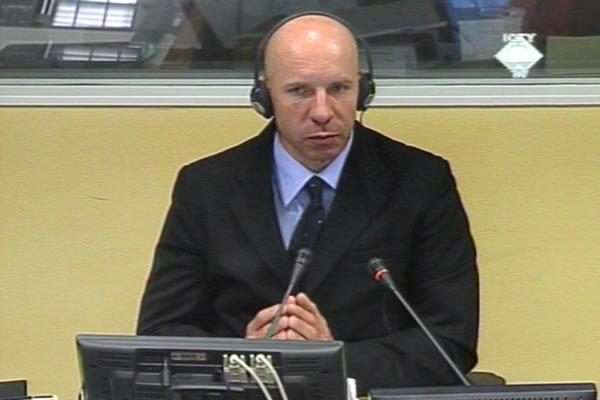Home
HOUSES WERE BURNING BUT NOT SET ON FIRE
Zdravko Janic, former coordinator of the Croatian special police, now its commander, admits he saw houses in flames in August 1995 in the village of Ramljani in Krajina. He contends that they were set on fire when they were hit in the fighting with the remaining Serb forces some twenty days after Operation Storm ended
 Zdravko Janic, witness at the Gotovina, Cermak and Markac trial
Zdravko Janic, witness at the Gotovina, Cermak and Markac trial As the examination-in chief of Zdravko Janic, one of the commanders of the Croatian Special Police, continued, the prosecutor dealt with the incident in the village of Ramljani near Otocac. In the statement he gave to the OTP investigators in 2004 the witness says he visited the village on 26 August 1995 after a ‘mop-up operation’. He saw several farm buildings and a house on fire. Although he is testifying as a prosecution witness, Janic tried to protect his former commander in the special police, Mladen Markac. Markac is on trial together with generals Ante Gotovina and Ivan Cermak for the crimes against Serbs in the course of Operation Storm and in its aftermath. Janic came to testify in The Hague after he received a subpoena from the Trial Chamber.
As soon as he saw the fire in Ramljani, Janic contends, he called the special police commander Mladen Markac to come and see it for himself. When Markac arrived, Janic recounted what he had heard from the special police commanders engaged in the mop-up operations. In their version of events, the special units had clashed with some remaining SVK soldiers in the village and had to fire their mortars. The Serb soldiers fled, but as the witness claimed, some civilian buildings were hit in the exchange of fire and caught fire afterwards.
The witness claims Markac was not happy with the things that had transpired and ordered an additional investigation. Janic did as he was ordered and his investigation pointed to the same conclusion: that ‘certainly there was fighting and the housed were set on fire, undoubtedly by mortar shells’. When he was asked if anyone from the special forces was prosecuted for that, the witness replied there was no need for that since the police ‘didn’t treat’ what happened in the village of Ramljani as ‘an incident’. According to Janic, Markac came to Ramljani from Knin where he was attending the celebration to mark the success of the operation in the presence of President Tudjman. This implies that while the highest officials celebrated the victory deep within the liberated territory, there was fighting going on along the former demarcation line.
Describing how the Croatian special police entered Donji Lapac in his 2004 statement to the OTP, the witness said the houses there had been damaged in an artillery attack. A year later, when he was interviewed by the prosecutors as a suspect, he claimed that the special troops strolled into Lapac not encountering any resistance; there was no need for any shelling. The indictment alleges that there was no military justification for the artillery attacks on the Krajina towns and villages. Their sole purpose was to make civilians flee the area. The prosecutor therefore asked the witness why Lapac was shelled if there was no military resistance. Janic explained that his unit had no need for artillery support but other units may have needed it on other axes of attack.
The defense of Mladen Markac today began the cross-examination of the witness that will be completed tomorrow.
Linked Reports
- Case : Gotovina et al. - "Operation Storm"
- 2008-07-09 WITNESS DIDN’T KNOW, MARKAC DIDN’T ASK
- 2008-07-08 WAS KRAJINA EXODUS SPONTANEOUS OR ORGANIZED?
- 2008-07-07 ‘DELIBERATE HARASSING FIRE’ ON KNIN
- 2008-07-11 UNWILLING PROSECUTION WITNESS DEFENDS MARKAC
- 2008-07-14 WITNESS: RANDOM SHELLING OF KNIN
- 2008-07-15 SUSAK WAS NOT HAPPY, TUDJMAN WAS NOT INTERESTED
